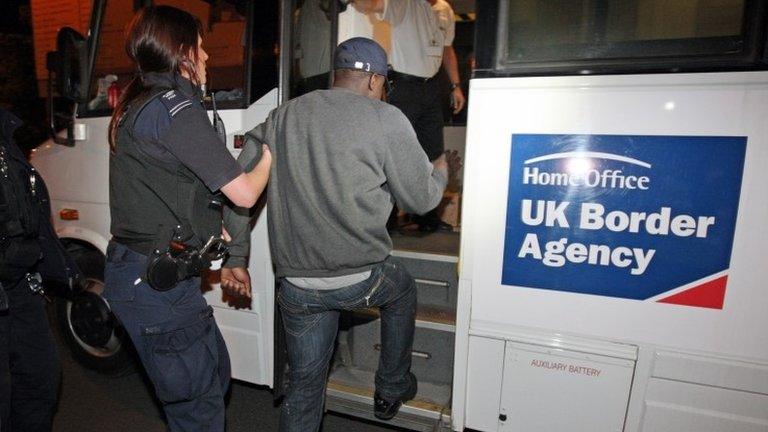Under the radar with the UK's illegal migrants
- Published
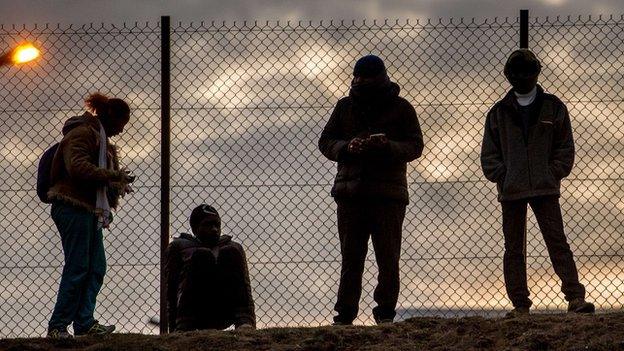
Migrants stand against a chain-link fence inside the Eurotunnel site in Calais
Among the thousands of refugees trying to enter Europe, some warn, are economic migrants exploiting their plight by trying to cross borders with them.
The home secretary has called for tighter measures to single out those who have a case to stay from those who don't.
However, nobody knows how many illegal migrants are already in the UK.
In 2009 an academic study, relied on by the Home Office, estimated the figure to be between 417,000 and 863,000.
In 2010 the campaign group Migration Watch said it was closer to 1.1 million.
These are the most recent available estimates but how do illegal migrants get here and how do they evade detection?

'Fake passport'
Victor is in his early 20s, has piercing blue eyes and an edgy haircut.
He takes me on a tour of the properties he has worked on as a builder in London.
There's a large retailer in Regent Street, the hospital opposite the Houses of Parliament and numerous bars in Russell Square.
He's not directly employed by the construction companies. He gets his work via an agency.
In 2011, he made his way to Italy, where he paid traffickers £2,500 for a false passport.
But when he flew into London, immigration officers realised his papers were fake.
He was fingerprinted and sent back to Italy.
He got another false passport and tried again, but he was deported for a second time.
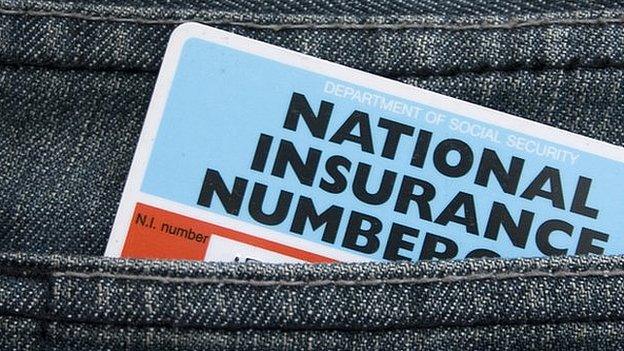
Undeterred, Victor tried to enter Britain from France by ferry. This time, he got in.
However, before he could start work on construction sites, companies required him to provide them with a valid national insurance number.
Instead of buying a set of fake documents, he paid someone to share their legitimate national insurance number with him.
"You find somebody who is British or [an] EU citizen and encourage them to help you, and we use their documents, photocopies, which would have our photographs on."
He says the other person is "selling their identity" to him.

'Let through'
I hear Ana's bold jewellery jangling down the corridor leading up to the room where we meet. She is a bubble of warmth and enthusiasm, with a thatch of thick black curly hair.
She first arrived in Britain in 2005 on a tourist visa from Brazil. When her visa ran out, she stayed on, working illegally as a housekeeper.
But in 2010, she was caught by immigration officers, fingerprinted and deported back to Brazil.
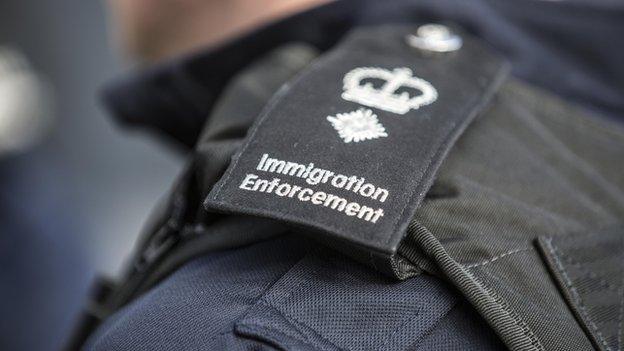
She quickly acquired a new Brazilian passport. Six weeks after being kicked out of Britain, she flew to Italy, where she paid a man £2,000 to accompany her back to the UK.
When they landed, her companion walked her through the immigration hall.
As she recounts this part of her journey, she bites her lip nervously.
"After showing a piece of paper to the immigration officer, we were let through," she says.
She doesn't know how or why she was allowed in.
She says she was just overjoyed, adding that she loves the UK.
Either immigration service systems failed to identify that Ana had been deported under her old passport or the person who accompanied her had arranged an "inside job".
However, that seems unlikely given she arrived at a busy airport.
She is now working as a nanny for a family who she says are aware of her illegal migrant status.

Listen again:
Can the UK Border Force deliver on the government's promises to make the UK an unattractive place for those who want to work illegally?
Hear BBC Radio 4's File on 4 programme Working in the Shadows

'Destroyed passport'
Ali has seen better days. Shabbily dressed, with matted black hair, he is clutching a plastic bag of food and clothes donated by a local charity.
For the past two years, he has been sleeping rough in Southall in west London.
He is Indian and first arrived in 2006. He paid £8,000 to people smugglers to bring him to the UK. He says he was taken from Mumbai across Europe in cars and lorries and crossed the English Channel by ferry.
He was dropped off in London, where he has spent the past nine years working as a day labourer.
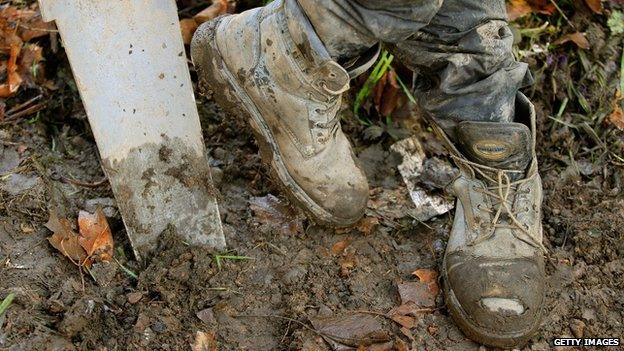
In the early hours of the morning, he waits on street corners hoping to get a job.
"I get picked up by anyone who needs labourers, it might be £40 or even £30 some days," he says.
Ali was arrested by immigration officers two years ago and was meant to be deported.
But when he first arrived in the UK, he destroyed his passport. It means the authorities cannot properly identify him or where he is from.
It therefore makes it very hard for them to know where to send him home. Added to that, some countries, including India and China, won't take people back unless they have the relevant paperwork to prove they are genuine nationals.
The irony for Ali is that he now wishes he could return home. Without a passport, he is stuck while the Indian authorities check his identity.
"It would be better if I had not come," he says.

'No rights'
Maria is from Brazil. Her working day begins at 06:00, when she is picked up in a van from a Tube station in south London along with about 10 other workers.
She will spend the next 12 hours working in the "shadow economy" as a domestic cleaner.
She gets £250 a week for 72 hours work. The hourly rate works out at less than £3.50 per hour, and the money is paid cash in hand.
Her employer, who is also Brazilian, won't tolerate people taking time off because they're sick, and there's no holiday pay.
"We only get 10 minutes to eat," says Maria.
"If we do more than 12 hours [work], we don't get paid extra. And if we ask the boss, she says, 'You know your rights.'
"We have no rights," she adds.
She came to Britain on a tourist visa but never returned home when it expired.
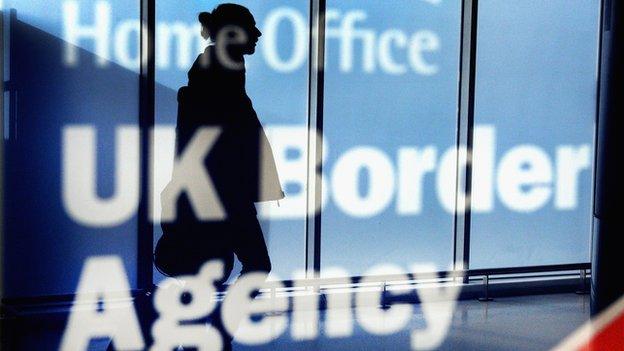
Maria knows she is being exploited but puts up with it for the sake of her 13-year-old son, who is desperate to stay in the UK.
He got a place at a secondary school in London four years ago.
When he started, the school asked to see his passport but not a residency visa.
Maria says checks have tightened and schools now want to see up an up-to-date visa, which he doesn't have.
Mother and son live in a single room in conditions she says are "horrible".
"He wants to stay here - but it's no life, it's miserable," she says.
- Published10 August 2015
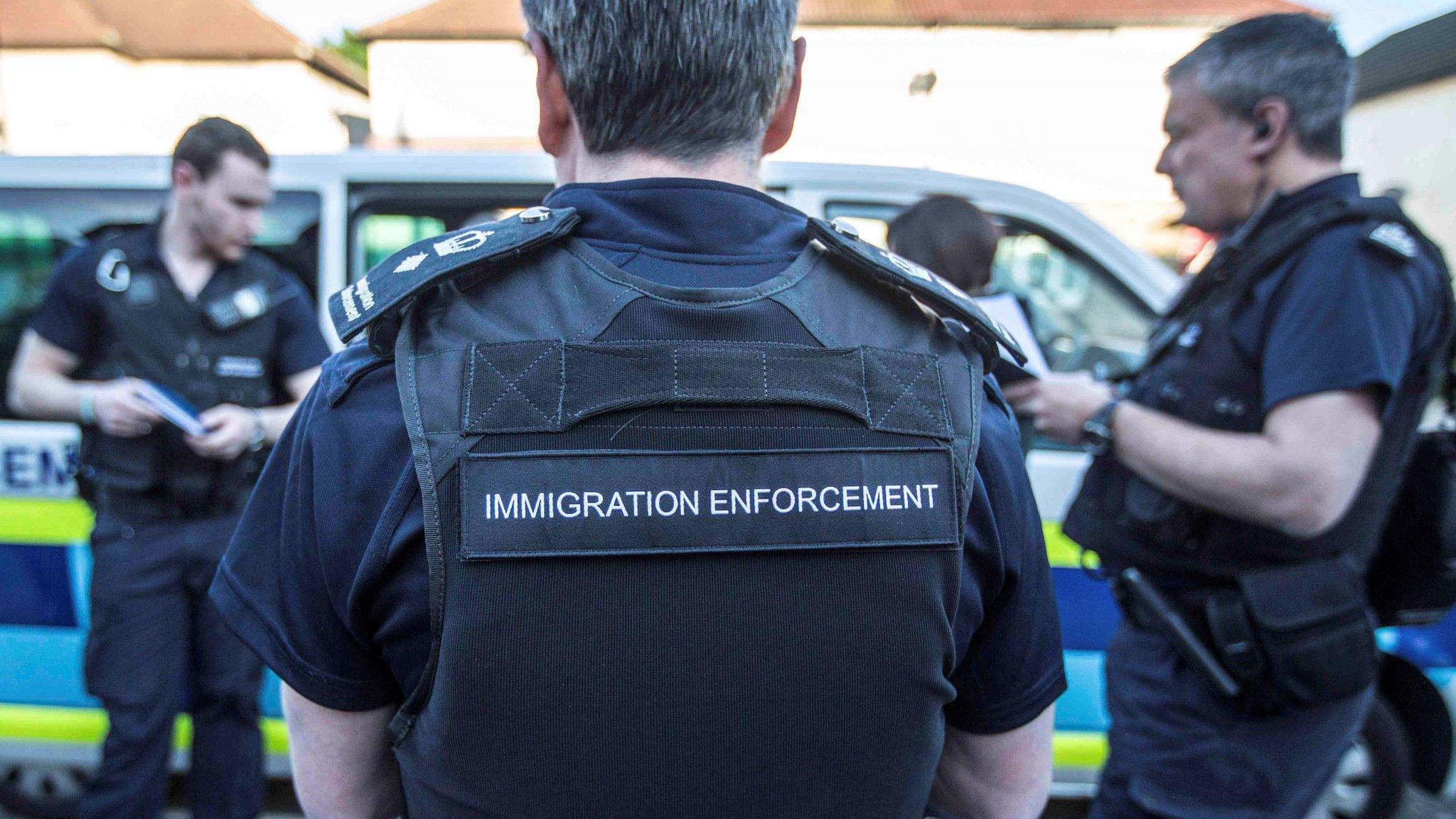
- Published3 August 2015

- Published25 August 2015
